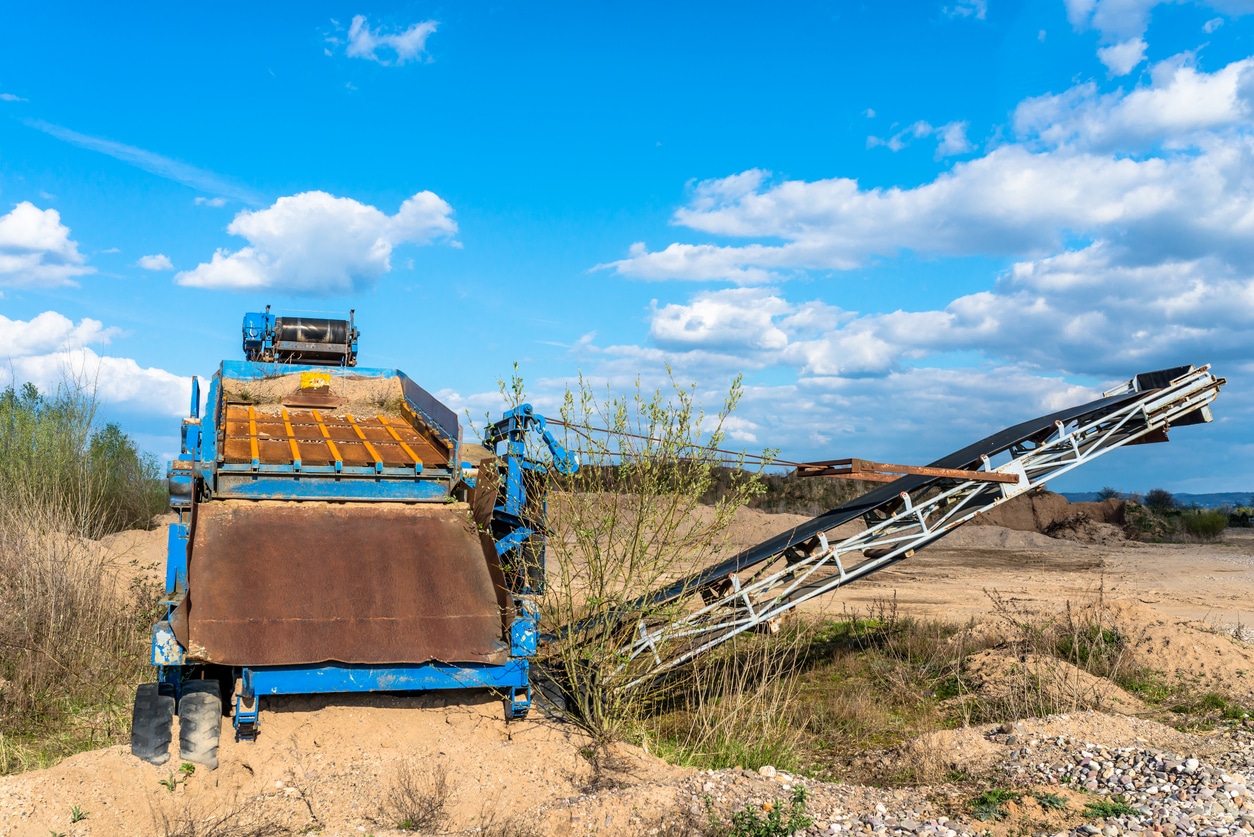
Processing raw materials into high-quality aggregates requires the right combination of equipment. Whether you’re running a quarry, construction site, or recycling facility, understanding the different types of wash plants and screening plants available can make the difference between meeting specifications and falling short of industry standards.
These specialized machines work together to separate, clean and size materials, ensuring your final products meet the demanding requirements of modern construction and infrastructure projects. With increasingly stringent quality specifications and the need for efficient operations, selecting the appropriate equipment for your specific applications has never been more critical for aggregate producers.
This comprehensive guide examines the various types of screening plants, essential wash plant components, and key considerations for choosing between portable and modular configurations to help you make informed equipment decisions.
Types of Screening Plants
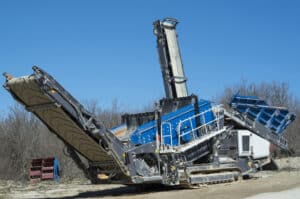 Screening plants form the backbone of material separation operations, with each type designed for specific applications and performance requirements.
Screening plants form the backbone of material separation operations, with each type designed for specific applications and performance requirements.
Static Screens
Static screens represent the most basic form of screening technology. These systems consist of one or more stationary screens with holes that catch large materials while allowing smaller particles to pass through. The screens can be positioned level to catch oversized materials or angled to encourage materials to slide off to designated areas.
While static screens may include conveyor systems to collect fine materials, they typically prioritize rejecting oversized materials rather than maximizing fine material recovery. This characteristic makes them suitable for initial sorting operations where precise separation isn’t the primary concern.
Static screens excel in applications requiring simple, cost-effective operation across multiple industries, including aggregates, demolition, recycling, and agriculture.
Scalping Screens
Scalping screens serve as the first line of defense in material processing operations. These robust systems use vigorous shaking motions to rapidly separate different grades of material, typically removing problematic items that could damage downstream equipment.
Most scalping screens utilize grizzly bars spaced at specific distances to control material passage. This configuration allows for rapid separation while accepting that sorted materials may not be uniform in all dimensions. The aggressive screening action effectively removes large materials, wet substances, and sticky debris from the feed stream.
Due to their focus on speed over precision, scalping screens rarely serve as final processing equipment but instead prepare materials for more refined screening operations.
Precision Screens
When final product quality matters most, precision screens deliver the accuracy needed for specification-grade aggregates. These systems differ from scalping screens in three key areas:
- They use mesh screens or perforated metal instead of grizzly bars
- They employ gentler shaking motions
- They process materials at slower speeds
The controlled screening action encourages materials to orient properly before passing through openings, resulting in more uniform sizing across all three dimensions. This precision comes at the cost of reduced throughput compared to scalping screens, making them ideal for final product preparation rather than initial sorting.
Precision screens produce ready-to-sell materials that meet strict industry specifications for construction and infrastructure applications.
Trommel Screens
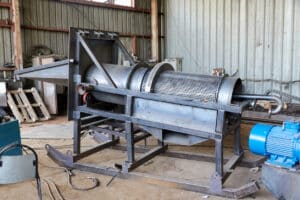 Trommel screens feature a rotating drum design similar to a clothes dryer, with perforated walls that allow small materials to fall through while retaining larger items. Internal corkscrew structures help move materials through the system, ensuring thorough exposure to the screening surface.
Trommel screens feature a rotating drum design similar to a clothes dryer, with perforated walls that allow small materials to fall through while retaining larger items. Internal corkscrew structures help move materials through the system, ensuring thorough exposure to the screening surface.
These versatile systems excel in:
- Agricultural applications
- Soil processing
- Waste management operations
Their gentle tumbling action makes them particularly suitable for fragile materials that might be damaged by more aggressive screening methods. Trommel screens can effectively handle materials with high moisture content and varying shapes that might prove challenging for conventional flat screening systems.
Star Screens
Star screens derive their name from the star-shaped wheels that propel materials through the system. Multiple rotating shafts with star-shaped discs move large materials from input to output while allowing smaller particles to fall between the stars onto collection conveyors.
The star wheels are typically constructed from rubber or polyurethane, making these systems ideal for processing organic materials like compost, mulch, bark, and agricultural products. However, this same gentleness makes them unsuitable for processing rocks, metals, and other hard materials.
Star screens provide an excellent solution for operations requiring careful handling of soft or irregularly shaped materials.
Essential Wash Plant Components
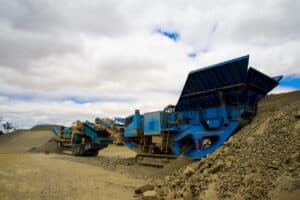 Wash plants incorporate various crushing and processing components to prepare materials for cleaning and final sizing.
Wash plants incorporate various crushing and processing components to prepare materials for cleaning and final sizing.
Jaw Crushers
Jaw crushers serve as primary crushing units in wash plant configurations, reducing large feed materials to manageable sizes for downstream processing. These robust machines use compressive force between fixed and moving jaw plates to break down oversized rocks and debris.
The adjustable nature of jaw crushers allows operators to control output size, making them versatile components for operations processing varied feed materials. Their reliable operation and straightforward maintenance requirements make them popular choices for wash plant applications.
Impact Crushers
Impact crushers utilize high-speed rotating hammers or blow bars to fracture materials through impact rather than compression. This crushing method produces more cubical particles compared to jaw crushers, often resulting in better-quality aggregate for specific applications.
These machines excel at processing softer materials and can effectively remove surface coatings or weathered material from aggregate surfaces. Impact crushers work particularly well in recycling applications where concrete and asphalt materials require processing.
Cone Crushers
Cone crushers provide secondary or tertiary crushing in wash plant operations, delivering precise size reduction for materials that have already undergone primary crushing. These machines use a rotating cone within a fixed outer crushing chamber to apply compression forces from multiple angles.
The ability to produce consistent, well-graded materials makes cone crushers valuable for operations requiring specific particle size distributions. Their efficiency in processing hard materials and ability to handle high-volume operations make them essential components in many wash plant configurations.
Portable vs. Modular Wash Plant Configurations
The choice between portable and modular wash plants significantly impacts operational flexibility, initial investment, and long-term productivity.
Benefits of Portable Configurations
Portable wash plants offer unmatched flexibility for operations with multiple job sites or varying material sources. These self-contained units can be relocated as projects demand, eliminating the need for multiple fixed installations.
The ability to move equipment to materials rather than transporting materials to equipment often results in significant cost savings, particularly for smaller operations or contractors working diverse projects. Portable configurations also provide opportunities to access remote deposits that might not justify permanent installation investments.
Modern portable plants feature sophisticated designs that deliver performance levels approaching their stationary counterparts while maintaining mobility advantages. Quick setup and breakdown capabilities minimize downtime during relocations.
Benefits of Modular Plants
Modular wash plants offer a versatile and efficient solution for operations requiring flexibility and scalability. These plants are designed with pre-engineered modules that can be easily transported, assembled, and reconfigured to meet changing production needs or different site conditions.
The modular design allows for faster installation and reduced downtime, making them ideal for projects with tight timelines or temporary operations. Their flexibility also enables operators to expand or modify the plant as production requirements evolve, without the need for extensive infrastructure changes.
Modular plants can integrate advanced processing equipment, such as multi-stage crushing circuits, screening systems, and specialized washing units, while maintaining the convenience of portability. They often require less upfront investment compared to permanent installations and can be relocated to new sites, ensuring long-term adaptability and cost-effectiveness.
Applications Across Industries
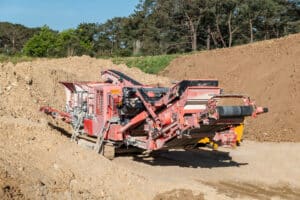 Wash plants and screening plants serve diverse industries, each with specific requirements and quality standards.
Wash plants and screening plants serve diverse industries, each with specific requirements and quality standards.
Aggregates Production
Natural and manufactured aggregates require processing to remove deleterious materials and achieve proper sizing. Operations typically combine crushing, screening, and washing equipment to meet various specification requirements for different construction applications.
Construction Projects
Construction aggregates like granite, limestone, sand, and gravel often require size reduction and cleaning before use. The processing sequence typically involves crushing oversized materials, screening to desired sizes, and washing to remove clay, silt, and other unwanted substances.
Recycling Operations
Recycled concrete and asphalt materials benefit from wash plant processing to remove contaminants and size materials for reuse. The combination of crushing and washing helps produce recycled aggregates that meet specifications for new construction projects.
Agricultural Applications
Agricultural operations use screening and washing equipment to process organic materials, clean produce, and prepare soil amendments. The gentler handling requirements often favor trommel screens and star screens designed for organic materials.
Selecting the Right Equipment for Your Needs
Success in aggregate processing depends on matching equipment capabilities to specific operational requirements. Understanding your material characteristics, production targets, and quality specifications guides equipment selection decisions.
Consider testing source materials before finalizing equipment purchases, as different deposits may require significantly different processing approaches. The investment in preliminary testing often pays dividends through improved equipment selection and more predictable operating costs.
Factor in long-term operational costs, including maintenance requirements, water consumption, and energy usage when comparing equipment options. The lowest initial purchase price may not represent the best long-term value when total ownership costs are considered.
Power Screening Can Help
If you’re looking for the right wash plant or screening plant for your aggregate operations in Colorado, New Mexico or Utah, Power Screening can help you determine the right machine for your specific applications. We’ve been the leading aggregate equipment dealer in the region since 1984, and we work with businesses in a wide range of industries, including:
- Aggregates
- Construction
- Demolition
- Agriculture
- Waste management
- Recycling
We’ve developed a reputation as a leading equipment provider due to our focus on developing long-term relationships with our customers. We want to make sure we provide you with the right aggregate equipment to suit your specific needs, and we’re committed to providing you with the support you need to optimize the performance and lifespan of your equipment.
If new equipment isn’t in your budget, we can still help. Power Screening sells used equipment and also rents equipment, ensuring you can get the right machine for your operations at a price you can afford.
Contact us today to schedule a consultation. Power Screening serves customers in Colorado, New Mexico and Utah.
